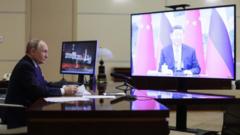The conversation, which lasted approximately one and a half hours, saw Putin warmly addressing Xi as his "dear friend." Both leaders pledged to elevate their countries' ties “to greater heights,” despite external challenges from the US. State media from both nations reported on their discussions, highlighting a unified stand against perceived external pressures on their growing partnership.
Putin emphasized the importance of friendship, mutual trust, and support in their cooperation, while Xi urged the need to deepen strategic coordination and bolster their mutual support. Notably, this dialogue took place just before Trump threatened tariffs against China, labeling it an "abuser" of trade practices, and warned Russia of potential repercussions if an agreement concerning the Ukraine conflict was not reached expeditiously.
Putin articulated the necessity for any resolution to the Ukraine crisis to respect Russian interests, a sentiment echoed by foreign affairs adviser Yuri Ushakov. Meanwhile, Beijing's role in aiding Moscow amid sanctions has drawn scrutiny, particularly regarding its provision of key military components for Russia's conflict in Ukraine.
In 2023, trade between Russia and China surged to an unprecedented $240 billion, reflecting a 64% increase since 2021, underscoring the significant economic ties that are developing unabated, even amidst geopolitical challenges. Ushakov noted the leaders' readiness to engage with the United States on a foundation of mutual benefit and respect if the Trump administration shows interest.
Despite the timing of this call coinciding with Trump's inauguration, Ushakov clarified that the discussion was not related to it. In addition to their reflections on bilateral relations, Xi and Putin addressed broader global issues, including the situations in the Middle East, South Korea, and Taiwan.
This call followed Xi's prior conversation with Trump, which the US President characterized as a “very good” dialogue focused on trade and issues such as fentanyl and TikTok. While Putin has yet to engage with Trump directly, he did extend congratulations to Trump on state television shortly before the inauguration, hinting at a complicated but active geopolitical landscape moving forward.
China's increasing role in the Russia-Ukraine war and the China-Russia partnership invites further analysis, as shifts in global alliances pave the way for new geopolitical dynamics.
History will determine how this development shapes international relations and whether these bilateral assurances can withstand external pressures from the West.
Putin emphasized the importance of friendship, mutual trust, and support in their cooperation, while Xi urged the need to deepen strategic coordination and bolster their mutual support. Notably, this dialogue took place just before Trump threatened tariffs against China, labeling it an "abuser" of trade practices, and warned Russia of potential repercussions if an agreement concerning the Ukraine conflict was not reached expeditiously.
Putin articulated the necessity for any resolution to the Ukraine crisis to respect Russian interests, a sentiment echoed by foreign affairs adviser Yuri Ushakov. Meanwhile, Beijing's role in aiding Moscow amid sanctions has drawn scrutiny, particularly regarding its provision of key military components for Russia's conflict in Ukraine.
In 2023, trade between Russia and China surged to an unprecedented $240 billion, reflecting a 64% increase since 2021, underscoring the significant economic ties that are developing unabated, even amidst geopolitical challenges. Ushakov noted the leaders' readiness to engage with the United States on a foundation of mutual benefit and respect if the Trump administration shows interest.
Despite the timing of this call coinciding with Trump's inauguration, Ushakov clarified that the discussion was not related to it. In addition to their reflections on bilateral relations, Xi and Putin addressed broader global issues, including the situations in the Middle East, South Korea, and Taiwan.
This call followed Xi's prior conversation with Trump, which the US President characterized as a “very good” dialogue focused on trade and issues such as fentanyl and TikTok. While Putin has yet to engage with Trump directly, he did extend congratulations to Trump on state television shortly before the inauguration, hinting at a complicated but active geopolitical landscape moving forward.
China's increasing role in the Russia-Ukraine war and the China-Russia partnership invites further analysis, as shifts in global alliances pave the way for new geopolitical dynamics.
History will determine how this development shapes international relations and whether these bilateral assurances can withstand external pressures from the West.




















